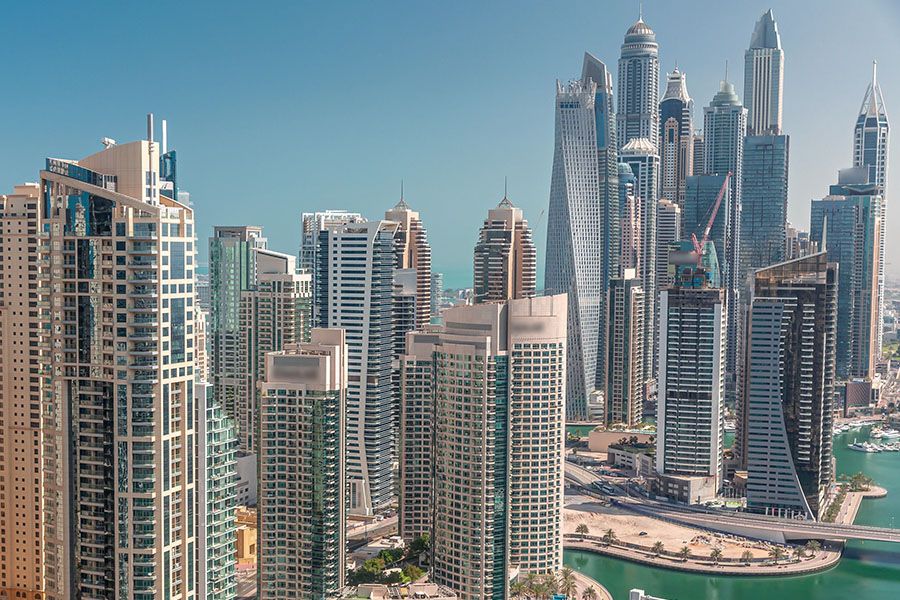Is there any Tax on Property Transactions in Dubai?

The real estate market of Dubai is one of the most sophisticated ones in the world, drawing attention from both the citizens of the UAE as well as foreign investors. Buying properties is a long-term investment, and there are lots of aspects you need to consider before making a purchase, one of them being the aspect of taxation that comes with it. Property tax in Dubai is one of the most refined and relaxed ones in the world.
In this space, we are going to look at the property taxation system in Dubai and understand the various types of fees you need to incur while purchasing a property in Dubai. This will help you in making your transaction legal, valid, and authorised, which will further secure and safeguard your investment.
Property Tax in Dubai
Before we get into understanding the property tax in Dubai, it is crucial to find the answer to the question of whether it is worth buying a property in Dubai. Well, the lucrative nature of the real estate sector of the city has been one of the foundational pillars behind its robust economy. There is validity to the evergreen demand for properties in the city. And the taxation system of the city also plays a major role in it.
The taxation policies in Dubai are among the most relaxed ones in the world. In fact, one of the interesting facts about Dubai is that it was one of the pioneering cities that granted complete tax exemption to foreign traders back in 1894. This was a path-breaking move that put Dubai on the world map and gave it the earliest recognition from foreign traders.
There is no property tax in Dubai, per se, that is imposed on residential properties. The city doesn’t impose property taxes, capital gains taxes, or income taxes on real estate. However, there are several other fees that an investor needs to take care of while purchasing a property in the city.
The 5% VAT (Value Added Tax) will have minimal impact on the real estate sector of Dubai and the UAE at large, as per the Federal Tax Authority (FTA) and Dubai Land Department (DLD). Both these governing bodies have ensured that all property transactions will either be exempted or not be subjected to the aforementioned 5% VAT.
The sale of vacant commercial properties or off-plan commercial properties under the building license is subject to a 5% VAT. It must be noted that the tax paid during the lease period can be recovered from the tax return of the tenant in the event they happen to be a taxable individual who is registered for tax purposes and entitled to a tax refund.
Tax paid towards the purchase of an entire building may be recovered according to the capital asset scheme if the cost of the property exceeds AED 5 million.
Various types of services related to real estate, such as consultancy, brokerage, and management, among others, are also subject to the VAT of 5% on the value of services that are rendered at the location of the property and as per the normal taxation business rules.
Fee for Buying Property in Dubai
As you can understand from the aforementioned discussion, investing in real estate is a lucrative option. Although there is no direct property tax imposed in Dubai, there are several other fees that the buyer has to incur when purchasing a property. Here is a closer look at these expenses.
DLD Fee
The DLD fee is a one-time tax paid to the government. It is calculated to be 4% of the value of the property in question. Furthermore, if the property is purchased through a loan, then the buyer has to pay an additional 0.25% of the total loan amount to the DLD as well in order to register the mortgage against the property.
Registration Fee
There is a registration fee that needs to be paid by the buyer. If the value of the property is less than AED 500,000, then the registration fee is AED 2,000. But if the value of the property in question is more than AED 500,000, then the registration fee is AED 4,000. A property has to be registered within 60 days of the purchase transaction; otherwise, it runs the risk of being void.
Agent’s Fee
Having a trusted and reputable agent can make the buying process extremely smooth. They give you the best advice during the buying journey. Although there are no agency or agent’s fees for off-plan properties, there is one for readymade properties. It is 2% of the value of the property.
Conveyance Fees
When the conveyancer's support and services are used, the buyer has to pay a conveyance fee. A conveyancer ensures the protection of all parties involved in the purchase and sale of a property and makes sure all the legal contracts and terms are maintained as per UAE law. This amount usually ranges from AED 6,000 to AED 10,000.
Mortgage Fees
If the purchase of a property is done through a mortgage, then a bank mortgage arrangement fee of 1% of the loan amount, along with a property valuation fee of AED 2,500 to AED 3,500, also has to be paid. To ease the burden on buyers, several banks in Dubai allow them to add these upfront costs to their mortgages. It should also be kept in mind that if the seller has a mortgage registered, then the buyer has to first pay out the seller’s mortgage to get a No Objection Certificate (NOC) during the transfer of property at DLD.

Housing Fee or Municipality Fee
The housing fee or municipality fee is a mandatory fee that serves as an annual charge for anyone in Dubai who owns or rents a residential property. It is typically 5% of the annual rental value of the property and can be paid in monthly instalments. Both the tenant and homeowner have to pay this. While the tenants have to pay 5% of their annual rent, homeowners have to pay an amount depending on the official rental value of their unit.
Service Fees
There is an annual maintenance charge on a property that needs to be paid to the DLD based on the Real Estate Regulatory Agency (RERA) Service Charge and Maintenance Index. The fee varies from community to community and is calculated at a specific charge per sq. ft. This amount is used to maintain the common areas of a community or building, such as swimming pools, landscaping, security, and elevators, among others.
Fee for Selling Property in Dubai
During the sale of a property in Dubai, there are several fees involved, the primary among them being the following.
DLD Fee
The DLD fee refers to a one-time tax that is paid to the government. It is calculated to be 4% of the value of the concerned property.
NOC Fees
The NOC fees usually range from AED 500 to AED 5,000. This fee is the confirmation of the fact that the seller has no outstanding service fees or charges left to pay.
Agent’s Fees
Selling a property on your own can be a gruelling process, which is why many sellers resort to the aid of a real estate agent or agency. While off-plan properties don’t bear any agency fees, readymade properties have an agency fee of 2% of the value of the property.
Conveyance Fees
With the help of a conveyancer, it is ensured that the rights of all the parties involved in the sale of a property are protected. It secures the sale process with a legal framework. Its price is subjective depending on the type of sale.
Fees for Mortgaged Properties
When you are selling a mortgaged property, there are some additional charges you need to pay. This includes early settlement fees, which refer to settling down of a mortgage earlier than scheduled, mortgage release fees, which help you in getting released from the existing mortgage, and blocking fees, which ensure the property can’t be sold to another party until the payoff of the seller’s mortgage is finalised.
To Conclude
The diverse residential and commercial properties, protection of investors’ rights, high rental yields, and access to a better quality of life make Dubai an apt place to live. As such, demand for real estate in the city is always soaring high.
Property tax in Dubai has been designed to facilitate the growth of the real estate market of the city. It supports transparent and safe transactional activities and offers a conducive environment for the development of the sector. As such, the real estate sector has become a valuable contributor to the national economy.
As you have seen, there are no direct property taxes in Dubai, but there are several other associated fees that a buyer and a seller have to pay during the purchase or sale of a property. Make sure to follow the legal guidelines and ensure that your transaction and purchase or sale process is a safe and secure one.
FAQs
Do you have to pay property tax in Dubai?
There is no direct property tax in Dubai, but there are several hidden fees, such as the DLD fee, agency fee, mortgage fee, and conveyance fee, among others, that a buyer or a seller needs to pay during the purchase or sale of a property.
Is there a property tax in Dubai for foreigners?
No, there are no property taxes in Dubai for foreigners, but there are other fees that a buyer or a seller needs to pay during the buying or selling process, such as registration fees, agency fees, and service fees, among others.
Is there VAT on property purchases in Dubai?
For the most part, there is no VAT applied to residential properties and bare land. However, a 5% VAT is imposed on the sales, leases, and other allied services of commercial properties.
How much is the property transfer fee in Dubai?
The property transfer fee is 4% of the total value of the property and must be paid to the DLD during the transfer of ownership of the property.
What is the DLD 4% fee?
The 4% fee that is paid to the DLD is a one-time tax paid to the government.
Is there any tax on rental income in Dubai?
No, there are no taxes on rental income in Dubai, making it a dream destination for investors.




